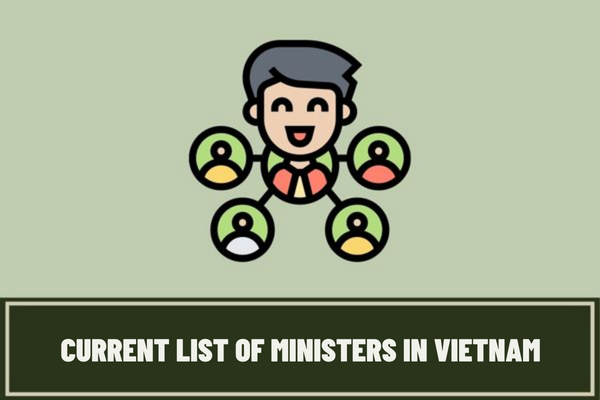Who is included in the current list of Ministers in Vietnam? What are the responsibilities of the Ministers toward the Government and National Assembly of Vietnam?
- Who are the current 18 Ministers in Vietnam?
- What are the responsibilities of ministers toward the Government of Vietnam?
- What are the responsibilities of the Ministers toward the National Assembly of Vietnam?
- What are the tasks and powers of the minister toward their Ministries according to the law?
Who are the current 18 Ministers in Vietnam?
The list of current 18 Ministers in Vietnam:
No. | Ministry | Minister |
1. | Ministry of National Defence | Mr. Phan Van Giang |
2 | Ministry of Public Security | Mr. To Lam |
3 | Ministry of Foreign Affairs | Mr. Bui Thanh Son |
4 | Ministry of Home Affairs | Ms. Pham Thi Thanh Tra |
5 | Ministry of Justice | Mr. Le Thanh Long |
6 | Ministry of Planning and Investment | Mr. Nguyen Chi Dung |
7 | Ministry of Finance | Mr. Ho Duc Phuc |
8 | Ministry of Industry and Trade | Mr. Nguyen Hong Dien |
9 | Ministry of Agriculture and Rural Development | Mr. Le Minh Hoan |
10 | Ministry of Transport | Mr. Nguyen Van Thang |
11 | Ministry of Construction | Mr. Nguyen Thanh Nghi |
12 | Ministry of Natural Resources and Environment | Mr. Tran Hong Ha |
13 | Ministry of Information and Communications | Mr. Nguyen Manh Hung |
14 | Ministry of Labor - Invalids and Social Affairs | Mr. Dao Ngoc Dung |
15 | Ministry of Culture, Sports and Tourism | Mr. Nguyen Van Hung |
16 | Ministry of Science and Technology | Mr. Huynh Thanh Dat |
17 | Ministry of Education and Training | Mr. Nguyen Kim Son |
18 | Ministry of Health | Ms. Dao Hong Lan |
Above is a list of 18 ministers in Vietnam.

Who is included in the current list of Ministers in Vietnam? What are the responsibilities of the Ministers toward the Government and National Assembly of Vietnam?
What are the responsibilities of ministers toward the Government of Vietnam?
Pursuant to Article 27 of Decree No. 123/2016/ND-CP stipulating the responsibilities of ministers toward the Government of Vietnam as follows:
Responsibilities of ministers toward the Government and Prime Minister
1. To be personally responsible to the Prime Minister and Government for assigned sectors and fields; for results and effectiveness and efficiency of operation of their ministries; and for their decisions and results of implementation of such decisions within their assigned tasks and vested powers; to perform the tasks of government members, and together with other government members to assume the collective responsibility for the operation of the Government.
2. To report on their work to the Government and Prime Minister.
3. Not to transfer affairs falling under their tasks and competence to the Prime Minister. For matters falling beyond their competence or related to other ministries, to take the initiative in working with the related ministers to make complete dossiers of these matters for submission to the Government or Prime Minister for consideration and decision.
Thus, the Ministers are personally responsible to the Prime Minister and Government for assigned sectors and fields;
At the same time, they are also responsible for results and effectiveness and efficiency of operation of their ministries; and for their decisions and results of implementation of such decisions within their assigned tasks and vested powers; to perform the tasks of government members, and together with other government members to assume the collective responsibility for the operation of the Government.
Ministers must report on their work to the Government and Prime Minister.
They must not transfer affairs falling under their tasks and competence to the Prime Minister. For matters falling beyond their competence or related to other ministries, to take the initiative in working with the related ministers to make complete dossiers of these matters for submission to the Government or Prime Minister for consideration and decision.
What are the responsibilities of the Ministers toward the National Assembly of Vietnam?
Pursuant to Article 28 of Decree No. 123/2016/ND-CP stipulating the responsibilities of ministers toward the National Assembly, National Assembly Standing Committee, National Assembly agencies and deputies, voters and the People as follows:
- To make reports and explanations and answer questions raised by the National
Assembly and National Assembly Standing Committee; to provide necessary documents at the request of the National Assembly Standing Committee, Ethnic Council or National Assembly Committees.
- To respond to recommendations of the Ethnic Council or National Assembly Committees in accordance with law.
- To respond to questions raised by National Assembly deputies and petitions of voters on matters in sectors and fields under their ministries’ state management.
- To make reports to the People on important issues under their management.
What are the tasks and powers of the minister toward their Ministries according to the law?
Pursuant to Article 24 of Decree No. 123/2016/ND-CP stipulating as follows:
Tasks and powers of ministers toward their ministries
1. To lead, direct and take personal responsibility for all aspects of work of their ministries; to direct units of their ministries in implementing approved strategies, master plans, plans, programs and projects, and perform tasks of their ministries assigned by the Government.
2. To promulgate according to their competence or submit to the Government or Prime Minister for promulgation legal documents and policies on development of their ministries’ assigned sectors and fields; to guide, review and organize the implementation of such documents.
3. To carry out the recruitment, appointment, relief from duty, dismissal, permission for resignation, suspension from the work, transfer, rotation, evaluation, planning, training, retraining, commendation, rewarding and disciplining of civil servants and public employees, and decentralize powers for management of civil servants and public employees to attached organizations and units in accordance with law.
4. To decide on decentralization of powers and authorization to attached organizations or units.
5. To decide on programs on scientific and technological research, and application of scientific or technological advances; standards, processes, regulations and technical- economic norms of sectors and fields according to their competence.
6. To decide on the establishment of interdisciplinary coordination organizations in accordance with law.
7. To decide on the appointment, relief from duty, dismissal, permission for resignation or suspension from work of general directors of general departments after receiving the Prime Minister’s opinions.
8. To decide on the appointment, relief from duty, dismissal, permission for resignation, suspension from work, commendation, rewarding and disciplining of deputy general directors of general departments and heads and deputy heads of departments, bureaus/agencies/authorities, inspectorates, offices and public non-business units of their ministries and divisions of departments (if any), divisions of ministerial inspectorates and divisions of ministerial offices in accordance with law.
To decide on the decentralization of powers for appointment, relief from duty, dismissal, permission for resignation and suspension from work of heads and deputy heads of organizations and units of general departments, bureaus/agencies/authorities and public non-business units of their ministries with law.
9. To lead and direct the inspection and examination of the implementation of laws in their ministries’ assigned sectors or fields nationwide.
10. To manage and organize the effective use of working offices, assets and equipment, finance and state budgets allocated to them; to decide on measures to prevent and combat corruption, practice thrift and combat waste and manifestations of bureaucracy and authoritarianism in their ministries’ assigned sectors and fields.
11. To promulgate their ministries’ working regulations, and direct and inspect the implementation of these regulations.
12. To lead and direct the administrative reform and reform of the regime of official duties and civil servants in sectors and fields under their ministries’ state management.
13. To take the initiative in closely coordinating with agencies of the Party, National Assembly, Supreme People’s Court, Supreme People’s Procuracy, Central Committee of the Vietnam Fatherland Front and central bodies of socio-political organizations; to give explanations about matters of concern of the Ethnic Council or National Assembly Committees; to answer questions raised by National Assembly deputies and petitions of voters, the Vietnam Fatherland Front and socio-political organizations on matters under their ministries’ management.
14. To perform other tasks assigned by the Government or Prime Minister.
Thus, the Ministers will have the tasks and powers of the minister toward their Ministries specified in Article 24 of Decree No. 123/2016/ND-CP.
LawNet
